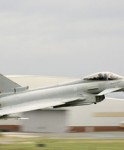 Pressure on senior BAE Systems board members hardened last night after it emerged that shareholders representing almost a fifth of the company had called for high-profile scalps. In a letter to the board, Invesco Perpetual, the biggest shareholder with 13 per cent and the principal critic of the failed 28bn pound merger with EADS, demanded the resignation of Dick Olver, the chairman, and Sir Peter Mason, the company’s senior director. Other shareholders representing a further 5 per cent of the company backed the proposal. It has been known for some time that Neil Woodford, the Invesco fund manager, has been hostile to BAE’s board, but this is understood to be the most aggressive move so far and sources close to the leading shareholders said that everything depended on where the assault went, writes The Times.
Pressure on senior BAE Systems board members hardened last night after it emerged that shareholders representing almost a fifth of the company had called for high-profile scalps. In a letter to the board, Invesco Perpetual, the biggest shareholder with 13 per cent and the principal critic of the failed 28bn pound merger with EADS, demanded the resignation of Dick Olver, the chairman, and Sir Peter Mason, the company’s senior director. Other shareholders representing a further 5 per cent of the company backed the proposal. It has been known for some time that Neil Woodford, the Invesco fund manager, has been hostile to BAE’s board, but this is understood to be the most aggressive move so far and sources close to the leading shareholders said that everything depended on where the assault went, writes The Times.
Lloyds last night dashed hopes it will curb excessive bonuses, saying it would not be reforming its pay structure in the ‘foreseeable future’. Expectations were raised after it emerged the state-backed lender has mooted plans to ban annual bonus payments for top staff in the wake of the investor backlash against boardroom greed. Its remuneration committee has been discussing a series of proposals to change the way it dishes out windfalls, The Daily mail says.
David Cameron has insisted that Britain will “stick to our guns” in a growing row over his promise to freeze the European Union’s budget. The Prime Minister renewed a threat to veto any real increase in the EU budget, despite warnings that his approach is alienating Germany’s Angela Merkel. EU leaders are negotiating a budget for the EU from 2014 until 2020. The European Commission has asked for a higher budget that would cost Britain an extra £10bn over seven years. In December 2010, Mr Cameron was a signatory to a letter saying that the EU budget should rise by “no more than inflation”. He told MPs that he stands by that call, threatening to block any budget deal that sees EU spending rise in real terms, according to The Telegraph.
Rolls Royce has beat GE, the diversified US conglomerate, to win what could turn into a multi-million-pound contract and consolidate the group’s strategic position in the US defence market. Rolls has produced a new, more powerful and efficient engine that impressed US appraisal teams, and the company believes the order will provide the platform for winning more contracts with other navies. Rolls will work with Textron, the prime contractor, on completing development of what is seen as a new generation of landing craft. Textron has won a $212m (£132m) order to build the initial development craft and Rolls will supply the engines for a further undisclosed sum. The US navy is in the market to buy 72 hovercraft for the new fleet, a contract that could lead to Rolls supplying more than 300 engines, The Telegraph reports.
Oil giant Shell has announced one of its biggest Scottish North Sea energy projects in the past decade which will pump 5% of Britain’s gas needs at peak production.The British/Dutch company said yesterday it would develop the Fram oil and gas field about 135 miles east of Aberdeen following the green light from the Department of Energy and Climate Change. Energy minister John Hayes said: “The durability of oil production in the North Sea constantly confounds expectation. “It is a tribute to the high-tech advances and expertise of British industry, which has constantly pushed the boundaries of what can be produced. Fram itself will add around 2% to our [total] oil and gas production – securing jobs, creating revenue and adding to our security of supply.” Shell, which shares the field with US-based Exxon Mobil, said Fram will come on stream in three years and produce 35,000 barrels of oil and gas equivalent a day (boepd) at its peak, The Scotsman says.
Vitaly Nesis, the chief executive of Polymetal, said that proposals to dilute London’s free-float rules, which require that 25% of a company is available for public purchase rather than being held in private hands, are a step in the wrong direction. “I strongly support tightening the rules for free floats,” Mr Nesis told The Times, adding that regulators should phase in a rule requiring that at least 50% of a company’s shares be made available for purchase, to stop private shareholders from wielding a controlling stake at the expense of minority investors’ interests. “Their interests are not aligned with shareholders,” he said. “The management runs amok and does stupid things.” The UK Listing Authority recently proposed cutting the free-float requirement to 20% and was prepared to do away with it altogether in some cases. Mr Nesis, however, claimed that the existing rules had hurt Polymetal’s image because it had become associated with other companies that have a poor reputation in terms of corporate governance, despite its free float being above 50%.
The number of small and medium-sized companies experiencing “significant” levels of financial distress rose by 10.5% in the third quarter of 2012, according to Begbies Traynor. The Aim-listed firm said the increasing proportion of small businesses showing symptoms such as a marked deterioration in working capital or a rise in county court judgments filed against them signals the growing threat of so-called zombie companies. These are businesses that are burdened with debt and unable to grow, but which are still generating enough cash to survive thanks to the benign attitudes of creditors and the low interest rates on their debts, Julie Palmer, a partner at Begbies Traynor, said: “These zombie companies are only just generating sufficient cash to pay the interest on their debts and keep creditors at bay. They are in no position to deal with unexpected costs, lost orders or bad debts or to fund increases in working capital and invest in growth,” The Telegraph writes.
Barack Obama and Mitt Romney locked horns, and also found areas of agreement, in a debate over foreign policy which was often hijacked by both candidates to speak about the economy. The two men went into the third, and final, US presidential debate before the November 6th poll effectively tied but also separated by small margins in the battleground states of Ohio, Florida, Virginia, Colorado, Iowa and New Hampshire. Mr Obama was the more aggressive of the duo, behaving as the underdog trying to goad his opponent into sharp argument. Apart from forays into the domestic economy, the 90-minute debate was focused on the Middle East, Pakistan, Iran and terrorism, with the last quarter of an hour on China. Mr Obama opened strongly, charging that Mr Romney’s diplomatic policy was “all over the shop” and saying he had erred in calling Russia America’s biggest “geopolitical threat,” The Financial Times explains.
Europe’s crippling debt burden increased by £500bn last year – with Britain’s finances among the worst anywhere on the Continent. The Eurostat statistics agency yesterday said government debt in the European Union jumped from £8trn in 2010 to £8.5trn in 2011 – or 82.5% of gross domestic product. The debt burden was highest in Greece, at 170.6% of national income, followed by Italy at 120.7%, Portugal at 108.1%, Ireland at 106.4%, Belgium at 97.8%, France at 86% and the UK at 85%. In total, 14 of the 27 countries in the EU had debt higher than the 60 per cent of GDP permitted under European law. Eurostat also said that 17 countries ran deficits above the 3% of GDP permitted by EU law – once again, this included Britain. The overall EU deficit fell from 6.5% in 2010 to 4.4% in 2011 but the worst offenders were Ireland with a shortfall of 13.4%, Greece and Spain with 9.4%, and the UK at 7.8%, The Daily Mail reports.


